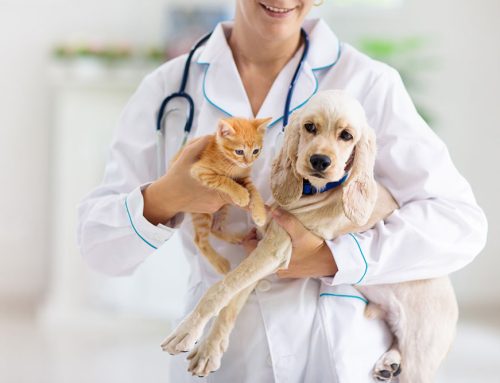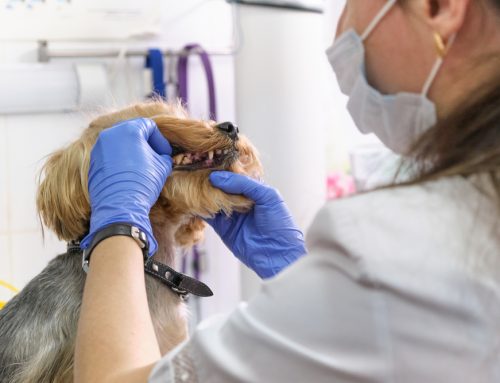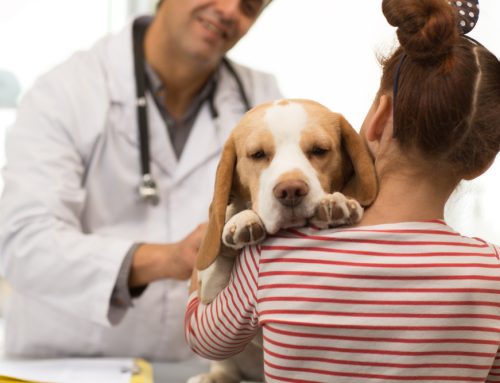Although we like to think we know our pets, much of their inner lives remain a mystery—leaving us to wonder why they do what they do. While many unexplainable behaviors can be attributed to pets being pets (e.g., your cat pouncing on your head in the middle of the night or your dog chasing their tail), the Westerville Veterinary Clinic team cautions that ignoring the following seven health-related signs can compromise your pet’s health, happiness, and longevity.
#1: Your pet experiences sudden weight loss or gain
Pay attention to your pet’s weight and body condition. Although mild fluctuations are typical throughout your pet’s life—especially during growth and development—sudden and unexplained changes can signal underlying health issues. Weight-related causes can range from inappropriate feeding to digestive problems (e.g., inflammatory bowel disease, malabsorption) or hormone-related disorders (e.g., diabetes or thyroid disease).
#2: Your pet is eating more or less than normal
Your pet’s appetite is a powerful prognosticator of their overall wellness. If your previously voracious eater suddenly becomes finicky or your once selective pet begins begging for food, something is likely amiss. Appetite can be influenced by various body systems, creating a wide range of possible reasons for why your pet is eating more or less. Common causes include dental issues, medications, gastrointestinal conditions, stress and anxiety, organ dysfunction, and many other problems.
#3: Your pet’s elimination habits are abnormal
In addition to observing your pet’s food intake, paying attention to their output (i.e., urine and stool) is critical. Persistent changes in urine or stool frequency, consistency, odor, and color can indicate an abnormality in their digestive or urinary system, as can a change in their effort or urgency (e.g., straining, house soiling, or vocalizing while eliminating).
#4: Your pet is sneezing, coughing, or experiencing eye or nasal discharge
Coughing and sneezing are natural reflexes designed to clear irritants from the upper respiratory tract, but frequent or productive sneezing and coughing can signal viral or bacterial infection and serious heart or lung-related conditions. Depending on the cause, untreated respiratory signs can lead to secondary issues, including pneumonia or cardiovascular complications.
#5: Your pet is unusually tired or weak
Pets are generally active, social, and curious—often inserting themselves into their household’s daily activities or creating mischief. If your pet is inexplicably tired or no longer participating in their normal activities, schedule an appointment at Westerville Veterinary Clinic. Lethargy can be a red flag for many serious conditions, such as pain, infection, or systemic illness. If your pet’s lethargy is accompanied by other clinical signs, especially those listed in this post, or they have a pre-existing condition, such as diabetes, thyroid disease, kidney failure, or cancer, seek prompt veterinary attention.
#6: Your pet has an unusual swelling, lump, or bump
Regularly petting your dog or cat does more than provide you both with a surge of feel-good hormones, it’s also a great way to check their body for abnormal swellings or masses. While many lumps and bumps are harmless, others can be an indicator of a more serious problem. No matter the cause, early detection and diagnosis can enhance your pet’s treatment and improve their outcome. When in doubt, have your pet’s lumps, bumps, and other skin changes checked out.
#7: Your pet is acting unusually
Like us, pets may behave differently when they’re sick, stressed, or in pain. Some pets will become more irritable or aggressive, others may appear anxious and seek attention, and still others will become withdrawn and avoid social interactions. No one knows your pet’s personality and behavior as well as you do, so if something is alarming or simply a bit odd, a full veterinary examination is necessary to determine the cause and help your pet feel like themself again.
Normal or not? Establishing your pet’s baseline

Although every species shares common behaviors, each pet is also an individual with unique quirks, habits, and preferences. Familiarizing yourself with your pet’s normal or baseline behavior can help you identify the previously explained signs, as well as more subtle changes that might otherwise go unnoticed. To help you become more attuned to your pet’s normal or baseline status, take proactive measures such as:
- Keeping your pet’s care updated with yearly or twice-yearly exams
- Requesting annual blood work, especially if your pet is over 7 years old
- Performing a monthly nose-to-tail pet-down or body check
- Taking quarterly pictures or videos of your pet in a standing position from above and the side
- Tracking your pet’s food intake, weight, energy, and elimination habits in a journal or calendar
Your pet relies on you to be their advocate—in sickness and in health. Although we hope the good days always outnumber the bad, staying vigilant and recognizing subtle changes in your pet’s health and behavior can help you play a crucial role in their wellbeing, longevity, and happiness.
Is your pet experiencing an unusual change in activity, personality, or health, or are they due for their annual exam? The Westerville Veterinary Clinic team is eager to assist you with every pet-related need. Contact us to discuss your pet’s condition or schedule their next visit.







Leave A Comment